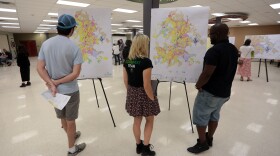The debate over rewriting Austin’s land use code has inflamed passions. People argue over how the plan, called CodeNEXT, will affect affordability, quality of life – the very character of Austin. Now, the proposal is exposing a division in Central Texas' tight-knit environmental community.
Kara Kockelman, a professor of transportation engineering at UT-Austin, says the debate comes down to the importance of balancing urban density and environmental stewardship. She says the research is conclusive when it comes to urban planning and the environment: The denser the development, the more efficient the transportation.
The idea is that the closer people live and work together, the less space they take up and the shorter their commutes, which means fewer emissions.
“Once you’ve built it, about 90 percent of the energy and emissions implications of anything come from the lifetime use of that infrastructure,” said Kockelman. “Whether it’s a vehicle or a home – a business, certainly. All of those things carry most of their environmental impacts downstream of construction.”
Kockelman’s research is cited in a new report from a group of Austin environmentalists that announced its support of density efforts in CodeNEXT yesterday.
“One of the reasons we are weighing in is that this is the first time in over 30 years that the city is re-looking at the code, and probably won’t look at it again for another 30 years,” Luke Metzger director of Environment Texas, said at a press conference at City Hall yesterday.
But the argument in favor of density is a tricky one to win in Austin, where growth has long been equated with environmental degradation. Local environmentalists have often joined with neighborhood groups opposed to density as a quality-of-life issue.
“The origins of Austin resisting development are environmental at their root,” said Council Member Jimmy Flannigan, who supports CodeNEXT. Flannigan says that opposition made sense when it was aimed at preventing sprawl development into environmentally sensitive areas – particularly, in the fight over a planned development over the Edwards Aquifer in the '90s.
“Yet, somehow it has morphed into [the idea that] the environmental way is to stop development in areas that are already developed,” he said. “The real magic is that – when we have redevelopment – if we fix the code through CodeNEXT, then the redevelopment actually creates a better city.”
But environmentalists are skeptical of CodeNEXT say their concerns go beyond anti-growth politics.
“We might agree that some reduced parking requirements, and some density in certain places, strategically would be a good idea,” said Lauren Ice, an attorney with the Save Our Springs Alliance, which led the fight against the Edwards Aquifer development. “[But] giving away entitlements to developers up front doesn’t get us the community benefit that we’re looking for.”
Ice, who worked on a taskforce to help develop CodeNEXT, says there’s still too much uncertainty around the plan, especially its impact on impervious cover and whether to accept or reject it.
In fact, if there’s one thing most people on all sides of the argument appear to agree on, it’s that more work needs to be done to improve CodeNEXT.





